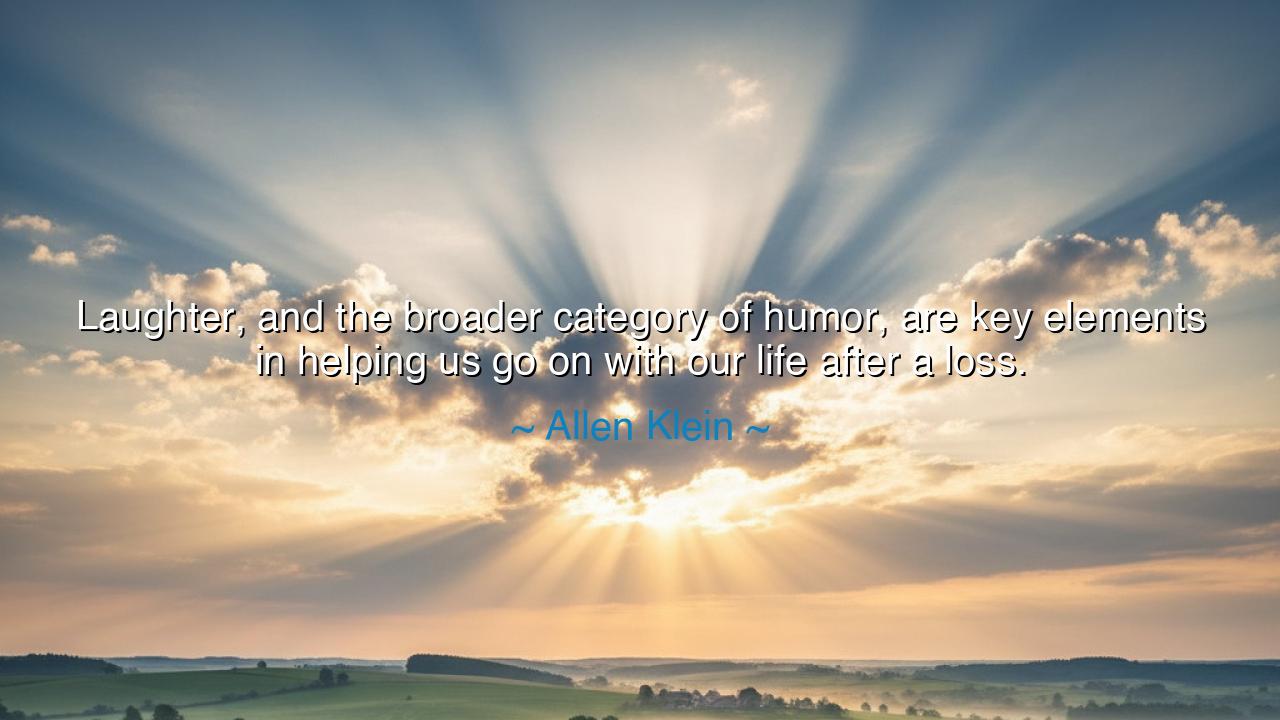
Laughter, and the broader category of humor, are key elements in
Laughter, and the broader category of humor, are key elements in helping us go on with our life after a loss.






When Allen Klein said, “Laughter, and the broader category of humor, are key elements in helping us go on with our life after a loss,” he spoke to a truth as old as humanity itself: that even in the shadow of grief, the human spirit has a way of finding light. Loss, whether of a loved one, a dream, or a part of oneself, can weigh heavily upon the soul. Yet humor and laughter act as salves, softening the sharp edges of sorrow and allowing us to breathe once more. In this, Klein reminds us that while pain is inevitable, suffering is optional — and that through laughter, we reclaim a measure of freedom.
The ancients understood the sacred role of laughter in the midst of hardship. In Greek philosophy, the wise often spoke of mirth as a form of courage. Aristophanes, in his comedies, revealed the follies and misfortunes of life so that audiences could face their own struggles with insight and amusement. Laughter was not an escape from tragedy, but a lens through which to view it with clarity and compassion. Like Klein’s observation, the ancients recognized that humor transforms grief, offering perspective and strength when despair threatens to overwhelm.
History offers countless examples of this truth in action. Consider Victor Frankl, imprisoned in Nazi concentration camps, witnessing unspeakable horror daily. Yet he noted that even in that darkness, prisoners would tell jokes, share absurd stories, and find moments of levity. That laughter was not frivolous; it was a lifeline, a reminder that no external cruelty could fully conquer the inner human spirit. Frankl’s ability to see humor in suffering mirrors Klein’s insight: that laughter is not denial, but endurance, a conscious choice to continue living fully despite loss.
Klein’s words also highlight the difference between fleeting amusement and profound humor. While a joke may provide momentary distraction, true humor encompasses empathy, perspective, and the ability to see meaning within chaos. In grieving, humor allows us to honor what we have lost without being consumed by it. It is the gentle reminder that life, though fragile, still contains moments of delight and connection, even when our hearts are heavy. Humor becomes the bridge between sorrow and survival.
Even in personal experience, laughter has proven its restorative power. Think of families who, after a tragedy, gather to tell stories, recalling the quirks and follies of the departed. In doing so, they weave grief into memory, sadness into story, and loss into shared humanity. The laughter that arises is never cruel; it is an act of remembrance and resilience. Klein’s assertion captures this ancient wisdom: through humor, we navigate the treacherous waters of grief and find our way back to life.
There is also a profound psychological truth in Klein’s words. Modern research confirms what the ancients intuited: laughter triggers the release of endorphins, reduces stress, and strengthens social bonds. After loss, these physiological effects are not trivial; they restore the body as well as the spirit. Humor becomes both shield and sustenance, the unseen hand that steadies us when the ground has shifted beneath our feet. In this sense, Klein’s insight is not only philosophical but deeply practical.
The lesson, then, is timeless: when faced with loss, seek not to suppress your grief, but to balance it with laughter and humor. Allow yourself to find absurdity, to see light in dark moments, to share stories that make your heart smile even through tears. In doing so, you honor what was lost while affirming the vitality of what remains. Laughter is the testament of the unconquered spirit, the quiet defiance that life, though fleeting, is worth living.
In practical terms, this means embracing moments of levity amidst sorrow — telling stories, sharing jokes, remembering the joyful quirks of those gone, and finding humor in life’s small ironies. By doing so, we heed Allen Klein’s wisdom: that laughter and humor are essential to survival, allowing the soul to carry grief without being crushed, to honor memory without being imprisoned by it, and to continue walking forward with courage, grace, and light in the heart.






AAdministratorAdministrator
Welcome, honored guests. Please leave a comment, we will respond soon